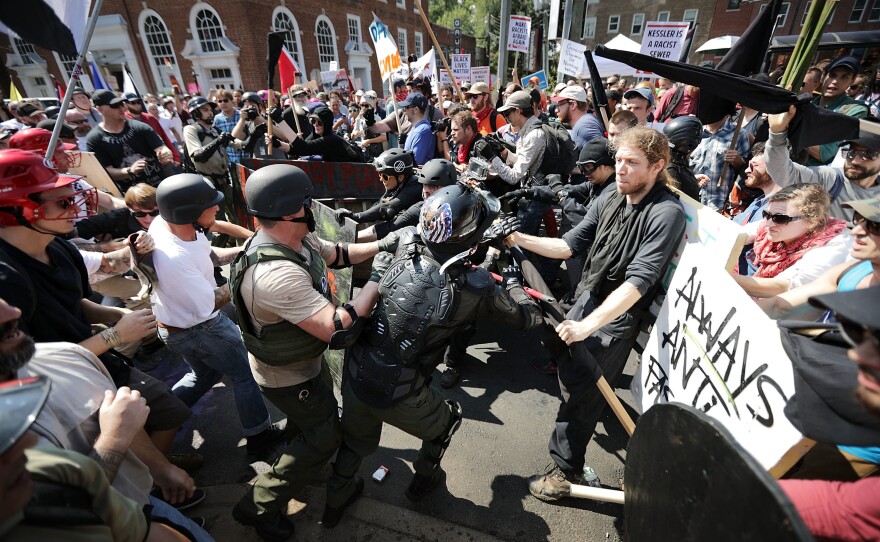The 2017 Unite the Right rally in Charlottesville, Va., turned violent, left one counter-demonstrator dead and revealed how well-organized the far right had become.
Four years afterward, jury selection is set for Monday in a case seen as the most sweeping attempt yet to hold to account those associated with the march. To do so, those behind the suit are taking a page from a decades-old playbook: they're turning to civil litigation in an attempt to put extremists out of business.
"We know that we can really bankrupt, disrupt and dismantle hate groups and their leaders through civil litigation," said Amy Spitalnick, executive director of Integrity First for America. IFA is a civil rights non-profit organization that is backing the lawsuit.
Kathleen Belew, a historian at the University of Chicago and author of Bring the War Home: The White Power Movement and Paramilitary America, said civil litigation has historically been important because criminal prosecution of violent white power activity has often failed.
"We have had a number of issues with effective returns in criminal trials for reasons ranging from ingrained problems in our legal system that have to do with long histories of white supremacy, to all kinds of procedural problems that have derailed justice in one way or another," she said. "Civil trials are a really good tool in hitting the pocketbooks and the membership lists of white power groups."
Landmark cases
The strategy was famously used by the Southern Poverty Law Center in several landmark anti-hate cases, particularly in the 1980s and 1990s.
In 1987, SPLC lawyers won a $7-million judgment on behalf of Beulah Mae Donald, whose 19-year-old son, Michael, had been abducted and brutally murdered by members of United Klans of America in Mobile, Ala. The group had to turn over their building to Ms. Donald and the suit effectively shut down its activities.
Similarly, the SPLC won multimillion-dollar judgments from the Christian Knights of the Ku Klux Klan, White Aryan Resistance, Aryan Nations and Imperial Klans of America in later civil lawsuits. They were all forced into turning over their assets to satisfy court judgments.
But in an age when much extremist activity is planned virtually — in social media channels — there are new challenges.
"In the the cases where we were litigating against the Klan in the 80s, they had property, physical land, and they had buildings and bank accounts that could be seized and taken," said Scott McCoy, interim deputy legal director for LGBTQ rights and special litigation at the Southern Poverty Law Center. "It's harder now in the digital age because a lot of these groups don't have those kind of assets. Their assets are in cryptocurrency and it's much harder to find and get at and attach those kind of assets."
McCoy is part of a legal team that represented Tanya Gersh, a Montana woman who sued Andrew Anglin in 2017 for organizing an anti-Semitic harassment campaign against her family.
Anglin runs a neo-Nazi website, and is also among the 24 named defendants in the Charlottesville trial. Gersh won a $14 million judgment against Anglin, but collecting on that has been a challenge. According to McCoy, Anglin has kept his money in Bitcoin, which has made it difficult to track.
"We are working with experts in the cryptocurrency world," he said. "They're helping us to try to find his assets and find ways to collect since we're kind of in this new world."
Lawsuits hamper far-right groups
Nonetheless, attorneys in the Virginia case say there's evidence that tying defendants up in a protracted and costly lawsuit has already disrupted their activity and influence.
"A number of them have said themselves that it has hampered their ability to go about business as usual," said Karen Dunn, a plaintiff's attorney in the Charlottesville case.
In a pre-trial court hearing, defendant Richard Spencer, a white nationalist who coined the term "Alt-Right," referred to the case as "financially crippling." He also acknowledged in an interview on a far-right YouTube channel that the lawsuit has led him to cut back public appearances for fear of being sued.
"One of the most striking facts to me in this case is that Charlottesville was really Charlottesville 2.0," said Dunn, referring to the fact that some of the participants had taken part in an earlier event in that city, which they had dubbed "Charlottesville 1.0," in May 2017. "There was every intention for there to be a Charlottesville 3.0, which did not happen, in part because of this case."
Roberta Kaplan, another attorney working with Dunn on the Charlottesville case, said significant financial penalties through civil action sends important messages. First, that Americans will not tolerate hatred-fueled violence on their streets. And second, that those who engage in such activities will be held accountable — potentially for years and decades beyond the conclusion of the trial.
"These people are all going to owe, I believe at the end of this case, very, very large monetary judgments," Kaplan said. "And the law gives our clients the ability to chase them down with those money judgments until they are paid."
Copyright 2021 NPR. To see more, visit https://www.npr.org. 9(MDAzMjM2NDYzMDEyMzc1Njk5NjAxNzY3OQ001))






